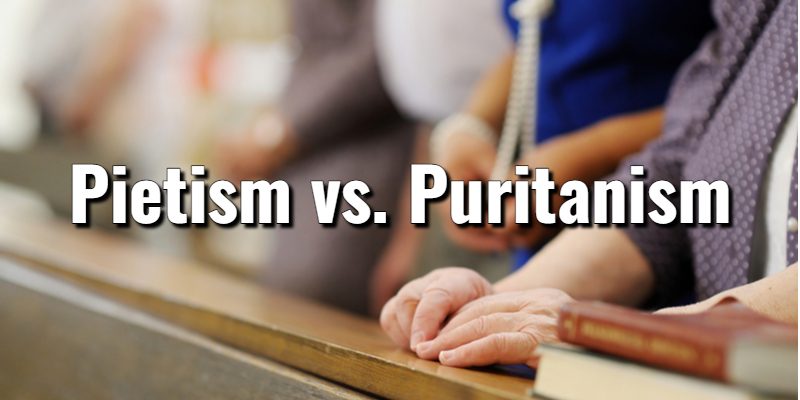Lord’s Library editors explore various Christian topics by comparing Pietism vs. Puritanism to help you gain an understanding.
When trying to understand the beliefs of different Christian denominations, it’s important to know where they come from. That is, to understand which ideas and times influenced a specific theological view. Pietism and Puritanism are two movements that have had a profound impact on church history, especially when we look to the modern-day. However, the two terms are often confused with one another and it’s vital to lay them both out for effective comparison.
As a result, the editors at Lord’s Library assembled this resource to compare pietism vs. Puritanism. In this resource, we seek to explain the differences between these two movements in a comprehensive way and understand which Christian traditions they have influenced today. This guide begins with a definition of each, along with a summary, and a comparison of key points at the bottom.
Pietism vs. Puritanism
What is Pietism? Pietism Definition
Pietism is a Christian movement centered around individual holiness and living a righteous life. There are several Christian groups today that would refer to themselves as Pietists. Various modern-day Christian churches have been influenced by Pietist teachings as well. Many Pietist movements arose out of frustration with the direction of the church. Throughout history, there have been many Pietist movements, each of which gave rise to a new sect within the Christian church.
A preacher in the 1400s, Jan Hus lived in what we now know as the Czech Republic and was an early leader of the Pietist movement. He was influenced by the teachings of John Wycliffe, and his work was focused on reforming the Bohemian Church. Hus’s teachings reached far and wide and even influenced the father of the Reformation Martin Luther. The modern Moravian or Bohemian Brethren Church is traced directly back to the followers of this prominent Pietist leader.
The Pietist movement played a key role in the formation of the Lutheran Church. Philipp Jakob Spener, who had been influenced by Pietist teachers, was convinced of the need for a moral and religious reformation within German Lutheranism in the 1600s. He saw the Orthodox teachings of the church as too rigid and sucking the life out of the church. He began small-group Bible studies in his home, encouraged involvement in church leadership by laymen, and employed a preaching style focused on personal holiness and spiritual maturity leading to good works for the furtherance of the Gospel.
During that time, many Lutherans stayed in the church and tried to make these reforms a reality. Others left, starting their own denominations. Many of these denominations included the term “Brethren,” including the Church of the Brethren which still exists today. Swedish Lutherans who were influenced by Spener’s teachings came to America and formed the Evangelical Covenant Church and the Evangelical Free Church of America. In England, the Pietist movement impacted John Wesley, who started the Methodist movement. The United Methodist Church is a union between the Methodist Church and the Church of the Brethren, showing that the impact of Pietist teaching runs deep indeed.
Pietism Defined
What is Puritanism? Puritanism Definition
The Puritans were a widespread and diverse group of people taking a stand for religious purity in the 16th, 17th, and 18th centuries, mostly in Europe. Arising during the Age of Enlightenment when literacy skills were on the rise, Puritanism represents the first time in human history when the masses could read the Bible for themselves. The ability to read and interpret God’s Word on one’s own led to a greater understanding among many Christian groups.
Some Puritans were connected with Anabaptists, but the majority were connected to the Church of England. The word Puritan was first used in the 1560s to denote someone who stood for purity in relation to worship and Biblical doctrine. The English Puritans believed that the Reformation didn’t go far enough in its aims to overhaul church established practices. As a result, they sought to create further reforms through internal action.
Puritan teaching has impacted many Christian groups today. The Congregational Church in America is a descendant of the early Puritan settlers. And any denomination that advocates congregational rule and individual piety is following the standards set forth by the Puritan movement.
The most well-known historical Puritan figures include John Bunyan, author of Pilgrim’s Progress, John Winthrop, author of City Upon a Hill, Cotton Mather, and John Foxe, author of Foxe’s Book of Martyr’s.
Puritanism Defined
Pietism vs. Puritanism; What’s the Difference?
While vastly different topics, both Pietism and Puritanism have left their mark on the Christian faith. They were also influential movements that helped to shape modern church thinking, especially among the reformed denominations. Many modern, mainline Christian movements feature a predisposition toward individual piety, and Puritan reforms did ultimately come to pass in several forms which are present in the reformed church today.
Understanding the differences between Pietism vs. Puritanism will serve Christians aiming to better understand the roots of church teachings which are prominent today.
Lord's Library participates in affiliate programs. We may make a small commission from products purchased through this resource.
- What Does the Bible Say About Achievements? With Key Scriptures - April 11, 2025
- What does the Bible Say About Abortion? With Key Scriptures - April 11, 2025
- Prosperity Gospel Meaning in the Scriptures: Is it Biblical? - April 7, 2025











